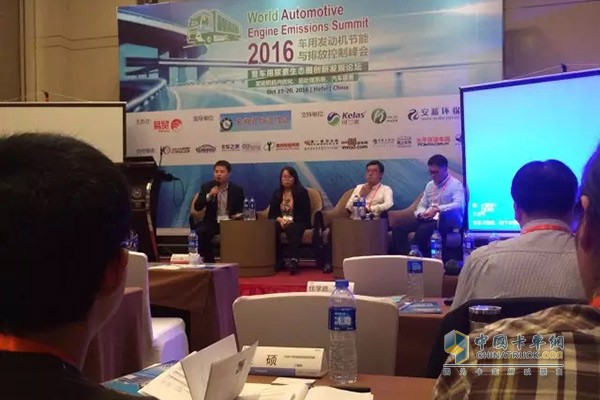 "2016 Automotive Engine Energy Saving and Emission Control Summit" opened in Hefei
"2016 Automotive Engine Energy Saving and Emission Control Summit" opened in Hefei Recently, the Ministry of Environmental Protection issued a solicitation of opinions on the “Limits and Measurement Methods for Vehicle Exhaust Pollutants for Compression Ignition, Gas Fueled Ignition Engines and Vehicles (China's Sixth Phase)â€. The article clearly stated that since January 1, 2019, all types of new engines and new automobiles undergoing type inspection should meet the requirements of this standard. From January 1, 2020, any new vehicle that does not meet the "Sixth National" emission standard will not be manufactured, sold, or registered. New engines that do not meet the requirements of this standard may not be produced, sold, or put into use.
This standard not only further increases the requirements for controlling the content of nitrogen oxides (NOx) and particulate matters (PM) in the exhaust gas of motor vehicles, but also puts emphasis on six key control points, including modifying RDE testing requirements and improving OBD testing requirements. Corresponding to the seven test tests. With the implementation of the Sixth National Emission Standard, the National Energy Administration also released the draft of the six national mandatory standards for “gas gasoline†and “vehicle diesel†in July 2016. A series of actions show that the Chinese government is actively promoting the process of controlling motor vehicle exhaust pollution and improving air quality.
In response to the background of the Sixth National Standard released, at this meeting, the Ministry of Environmental Protection’s motor vehicle emission control center, Wang Jun, focused on the analysis of the six emission standard schemes for light vehicles and heavy vehicles. She pointed out that, unlike the previous standards, the standard limits for gasoline vehicles and diesel vehicles are not the same. In the National Sixth Standard, the pollutant limits for gasoline vehicles and diesel vehicles are the same. In addition, the Sixth National Standard has added new requirements for evaporative emission control, pollutant discharge control at low temperatures, and emission control under actual RDE driving conditions.
According to Yue Xin, a senior researcher at the Chinese Research Academy of Environmental Sciences, fuel quality has a huge impact on air quality. To meet more stringent emission standards, it is necessary to further improve fuel quality and implement more stringent fuel quality standards. He also introduced the detergency and main role of vehicle gasoline and automotive diesel.
In addition to the interpretation of macro policies and market trends, the meeting also discussed the internal optimization and emission treatment of internal combustion engines. At the meeting, the issue of emission control of diesel vehicles was also mentioned several times. The pollution of heavy-duty diesel vehicles is a problem that many cities must face. To effectively control heavy-duty diesel vehicles, it is necessary to establish a comprehensive supervision system for motor vehicle compliance standards, strictly implement motor vehicle and oil product standards, and increase supervision. For heavy-duty diesel vehicles, supervision and inspection shall be carried out in production and sales, and severe violations shall be imposed on illegal production and sales of vehicles that do not meet the emission standards. A multi-pronged approach can significantly reduce the emissions of heavy-duty diesel vehicles.
At present, the six countries of reserve countries and six countries in R&D countries are currently the top priorities for the production of fuel oil, engines, aftertreatment systems, and other related maintenance products for motor vehicles. On October 20th, Qin Jian , general manager of Kelan, attended the summit and delivered a speech. He talked about the development strategy of the vehicle urea industry and exchanged with the industry experts the construction and operation of the vehicle urea ecosystem.
Auxiliary Machines,Plastic Pulverizer,Plastic Crusher Machine,Plastic Recycle Crashing Machine
Zhoushan Taisu Overseas Co Ltd. , https://www.taisuoverseas.com